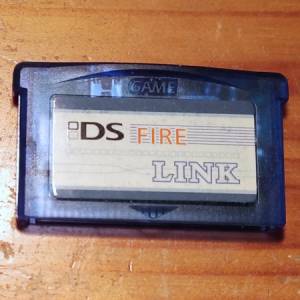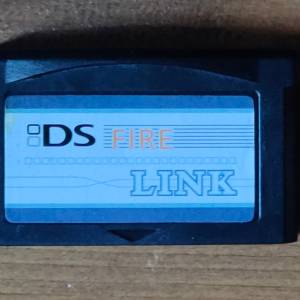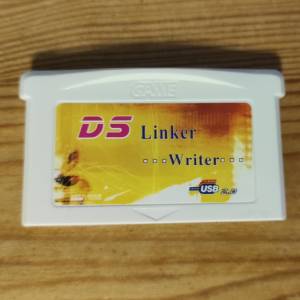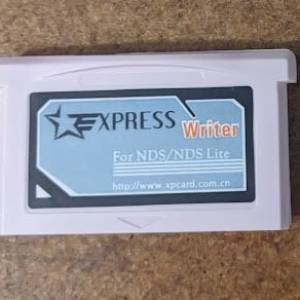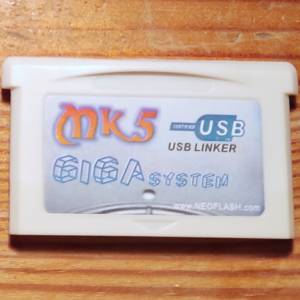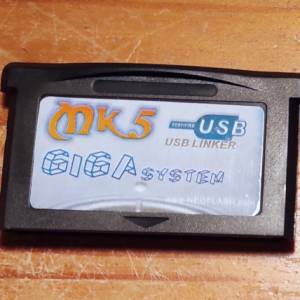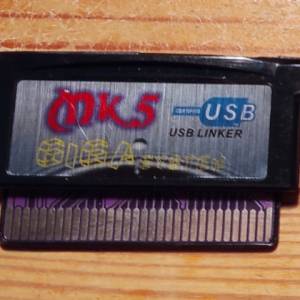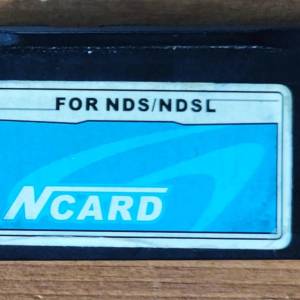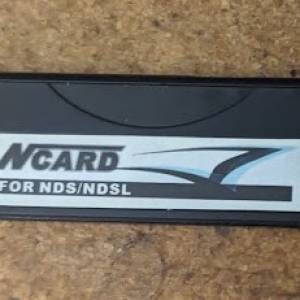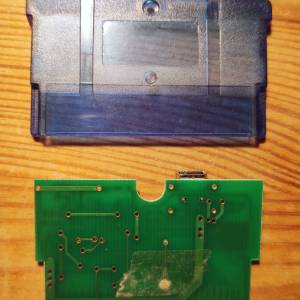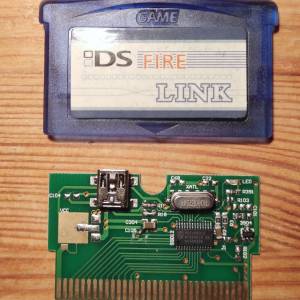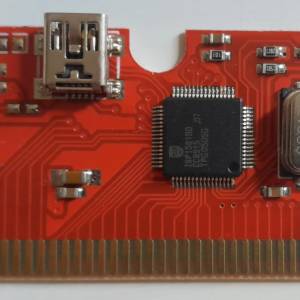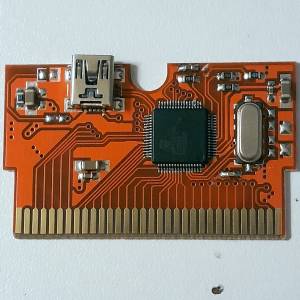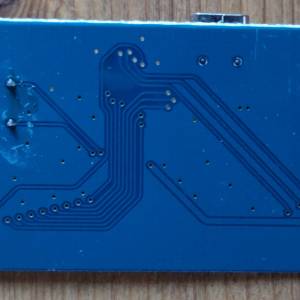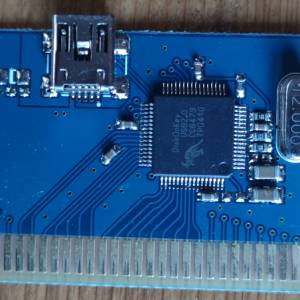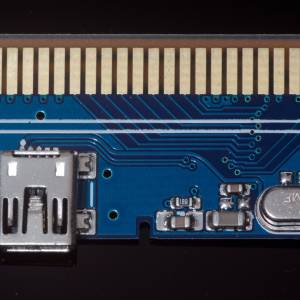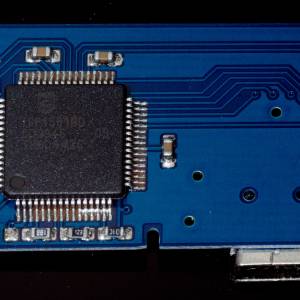Table of Contents
DS Linker Writer/N-Card (Slot-2 USB cart)
The DS Linker Writer (also known as the N-Card, ExpressCard, DS Fire Link, etc.) is a Slot-2 GBA cartridge with an USB controller; in combination with a software USB stack running on the DS itself, it allows the console to act as an USB device.
Two variants exist:
- the “D12”, featuring USB 1.1 support, based on a PDIUSBD12 chip.
- This chip was only used in early batches of the card.
- Due to a regression bug, this variant only works with older releases of uDisk. It also doesn't support homebrew built with the open source Keil stack.
- the “D14”, featuring USB 2.0 support, based on an ISP1581 (or equivalent) chip.
- The most common variant.
To identify the variant in your possesion, you can use nrio-usb-disk (linked below), which displays the detected chip ID:
1012- “D12” board (PDIUSBD12-based)1581- “D14” board (ISP1581-based)- other values - unknown chip
- The TinyUSB stack used by nrio-usb-disk can support
1582and1583boards (ISP1582/83-based), if any such turn out to exist.
0000,FFFF- unknown board (or no board!)
Alternatively, you can compare the PCB with photos available below.
Software
- NitrousTracker - music tracker, supports USB MIDI in versions 0.4.11+
- nrio-usb-disk - USB mass storage driver, compatible with any Slot-1 DLDI flashcart
- DSMouse - mouse emulator
- DSPad - gamepad emulator
- DSPad Tilt - gamepad emulator with motion controls (DSMotion/MK6/R6 required in Slot-1)
- uDisk - official USB mass storage driver, supports N-Card only
Implementations
- TinyUSB port - MIT licensed
- Requires a recent version of BlocksDS; comes with examples.
- Full support for “D14” and “D12” boards.
- Keil USB stack port by the N-Card/DS Linker team
- Contains examples intended for an ancient version of devkitARM/libnds.
- Full support for “D14” boards.
- No support for “D12” boards.
Photos
Cartridges
Note that the casing color may differ between batches.
D12
D14
(Source: ApacheThunder, Disturbo)
Notes:
- The MK5 GIGA with a purple PCB and exposed pins is the only one on this list not to feature a mini-USB connector; rather, a non-USB-standard connector is used.
PCBs
DS Fire Link (D12)
DS Fire Link (D14)
ExpressCard Writer (D14)
N-Card (D14)
DS Link? (D14, "Lite" form factor)
Wiring
D14 (ISP1581)
The DS Linker Writer uses an ISP1581 (or clone, depending on batch) USB controller and a 12 MHz crystal.
In theory, it should be possible to replace the chip with an ISP1582 or ISP1583 in newer designs while maintaining compatibility.
TODO: Mark power pin connections?
_____
/ \
DGND / 1 64 \ VCC(3.3)
VCC(5.0) / 2 _ 63 \ TEST
AGND / 3 / \ 62 \ WAKEUP
VCCA(3.3) / 4 \_/ 61 \ DGND
USB D- <> D- / 5 60 \ XTAL1 <- 12 MHz oscillator
USB D+ <> D+ / 6 59 \ XTAL2 -> 12 MHz oscillator
RPU / 7 58 \ VCC(3.3)
RREF / 8 57 \ DATA15 <> GBA AD15
MODE1 / 9 56 \ DATA14 <> GBA AD14
/RESET / 10 55 \ DATA13 <> GBA AD13
EOT / 11 54 \ DATA12 <> GBA AD12
DREQ / 12 53 \ DATA11 <> GBA AD11
DACK / 13 52 \ DATA10 <> GBA AD10
DIOR / 14 51 \ DATA9 <> GBA AD9
DIOW / 15 50 \ DATA8 <> GBA AD8
INTRQ / 16 49 \ DATA7 <> GBA AD7
/ \
\ Philips/NXP ISP1581 /
/CS1 \ 17 48 / DATA6 <> GBA AD6
/CS0 \ 18 47 / DATA5 <> GBA AD5
DA0 \ 19 46 / DATA4 <> GBA AD4
DA1 \ 20 45 / DATA3 <> GBA AD3
DA2 \ 21 44 / DATA2 <> GBA AD2
READY \ 22 43 / VCC(3.3)
DGND \ 23 42 / DGND
VCC(3.3) \ 24 41 / DATA1 <> GBA AD1
GBA /CS <-/CS \ 25 40 / DATA0 <> GBA AD0
GBA /RD <- /RD \ 26 39 / AD7 <- GBA A23
GBA /WR <- /WR \ 27 38 / AD6 <- GBA A22
GBA /IREQ <- INT \ 28 37 / VCC(3.3)
A0 \ 29 36 / DGND
GBA A16 -> AD0 \ 30 35 / AD5 <- GBA A21
GBA A17 -> AD1 \ 31 34 / AD4 <- GBA A20
GBA A18 -> AD2 \ 32 33 / AD3 <- GBA A19
\ /
\ /
\ /
V
GBA cartridge port
|________________________________|
|: :|
|::::::::::::::::::::::::::::::::|
1 |::::::::::::::::::::::::::::::::| 32
|||||||||||||||||||||||||||||||'- /GND
||||||||||||||||||||||||||||||'- /IREQ
|||||||||||||||||||||||||||||'- /CS2
|||||||||||||||||||||'+++++++- A16-23
|||||||||||||||||||||
|||||'+++++++++++++++- AD0-15
||||'- /CS
|||'- /RD
||'- /WR
|'- PHI
'- VDD
D12 (PDIUSBD12) variant
A much rarer, alternate design uses a PDIUSBD12 chip instead, configured with a separate address/data bus.
In theory, it should be possible to replace the chip with an FT120, a modern replacement chip, while maintaining compatibility. However, minor differences exist, and this has not been tested on actual hardware.
TODO: Mark power pin connections?
/\
/ \
/ \
: 28 \ A0 <- GBA A16?
_./ 27 \ VOUT(3.3)
/ 26 \ D+ <> USB D+
/ o 25 \ D- <> USB D-
GBA AD0 <> DATA0 \ 1 24 \ VDD
GBA AD1 <> DATA1 \ 2 P 23 \ XTAL2 -> 12 MHz oscillator
GBA AD2 <> DATA2 \ 3 D 22 \ XTAL1 <- 12 MHz oscillator
GBA AD3 <> DATA3 \ 4 I 21 \ GL_N -> LED
GND -- GND \ 5 U 20 \ /RESET <- GBA AD8?
GBA AD4 <> DATA4 \ 6 S 19 \ /EOT
GBA AD5 <> DATA5 \ 7 B 18 \ /DMACK
GBA AD6 <> DATA6 \ 8 D 17 \ DMREQ
GBA AD7 <> DATA7 \ 9 1 16 \ /WR <- GBA /WR
GND -- ALE \ 10 2 15 \ /RD <- GBA /RD
GBA /CS -> /CS \ 11 /
SUSPEND \ 12 /
CLKOUT \ 13 /
GBA /IREQ <- /INT \ 14 /
\ /
\ /
\/

